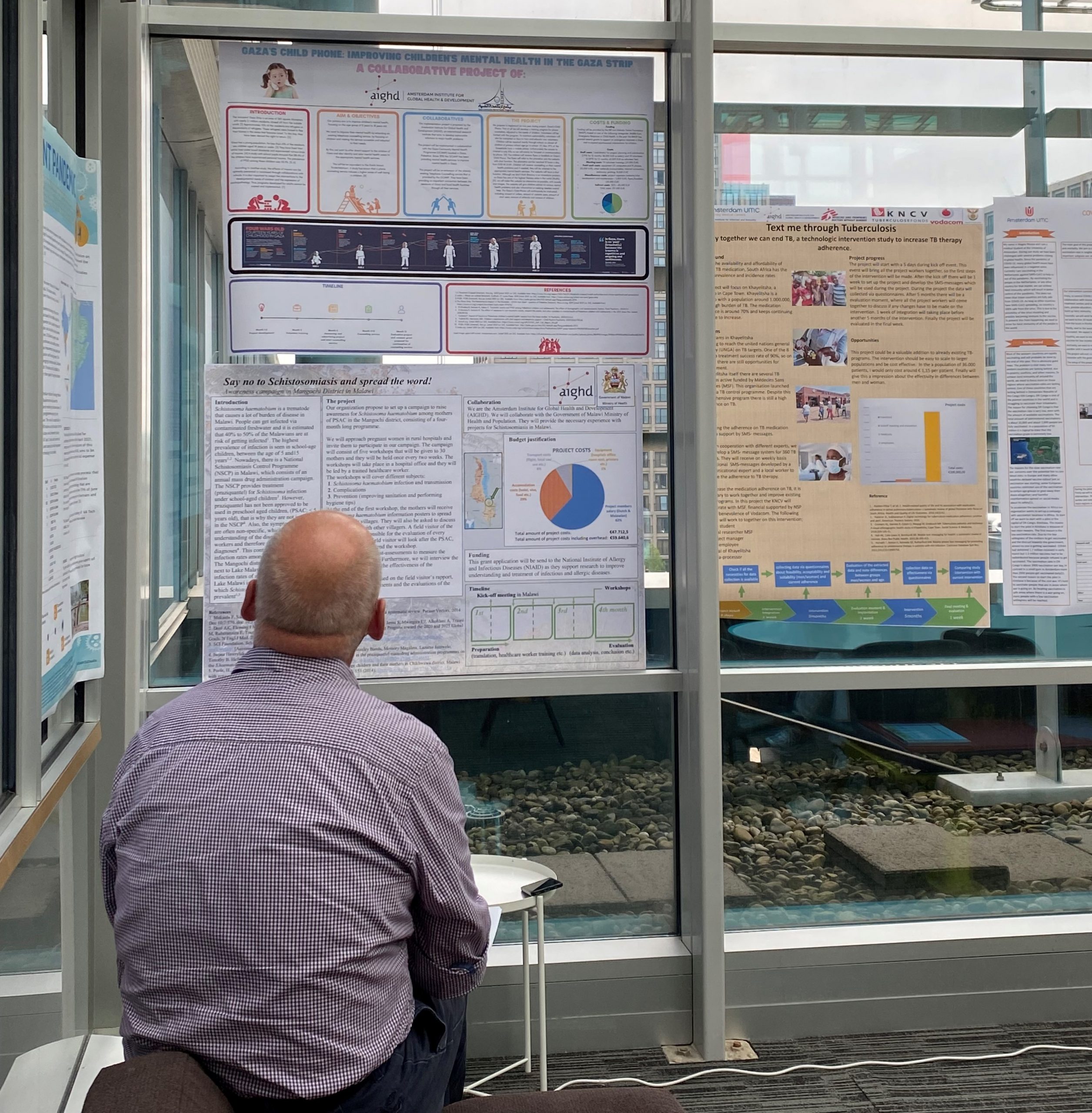
09 Jul Reframing Education at AIGHD: How the Pandemic Forces Innovation
AIGHD acknowledges that education is pivotal in global health and development, whether it pertains to building health capacity in the global south or training a new generation of researchers here in the Netherlands. AIGHD’s educational ethos―extending from the Research Master’s in Global Health program at VU, to the Joep Lange Chair and Fellows Masterclass and various smaller events―has not waned in times of COVID-19. Though teaching during a global pandemic remains a challenge, AIGHD’s education team, led by Guus ten Asbroek, has collaborated with various parties to find novel ways to facilitate learning digitally.
Creativity in socially distanced learning is evident in the AIGHD-run education activities within the Amsterdam UMC Bachelor’s in Medicine program. AIGHD’s education team has cleverly implemented the reverse classroom model in this program, where students do preliminary readings to prepare for virtual group activities. For example, second year students participated in a simulated cholera outbreak at a Yemeni refugee camp that involved e-learning and even a prior consultation with a Red Cross affiliate. This roleplay was both practical and topical, as Yemen has had a pervasive cholera outbreak for nearly five years.
A key concern of the education team is that online events promote student engagement through exercises relevant to real world problems. Achieving this entails thinking outside of the box. Pertinent student engagement was the impetus for virtual field trips in the Global Health in Action elective that allowed students to “travel” to various global health organizations’ offices, such as a tuberculosis program in Vietnam, PharmAccess in Tanzania, and even the Bill & Melinda Gates Foundation in Seattle.
The most recent virtual field trip was conducted with AFEW International, a long-time partner of AIGHD. Guus remarked that it has been a pleasure collaborating with AFEW International for educational events due to their understanding of digital interactivity: “We knew it worked because we collaborated with them in the past. AFEW International has been on the list for several years and they take the education of students very seriously.” The recent reverse classroom field trip involved students preemptively reading various documents from AFEW International, including a grant proposal, and preparing questions for speakers. The event itself consisted of three primary blocks: an introduction to AFEW International, a summary of a symposium co-organized with AIGHD, and lastly, an interactive grant proposal analysis activity and brief Q&A session.
Yuri de Boer, Director of AFEW International, introduced the organization and its role in the Eastern Europe and Central Asia (EECA) region. The EECA region has the fastest growing HIV epidemic in the world, and millions of people are in need of treatment for comorbidities like tuberculosis and hepatitis C. There are treatment enrollment gaps for HIV positive testers and many enrolled do not adhere to treatment effectively, leading to poor viral suppression, further infections, and many AIDS-related deaths. AFEW International uses a human rights based approach to advocate for vulnerable key populations―including injection drug users (IDU), men who have sex with men (MSM), and prisoners―who face legal and social barriers to adequate health resources. AFEW International promotes harm reduction, community engagement, and education to help these vulnerable groups that comprise the vast majority of people living with HIV in the region.
Irina Orlova, the Administration Manager of AFEW International, discussed the EECA INTERACT conference in Almaty, Kazakhstan. AFEW International’s integrative health mission, entailing human rights, education, and community engagement, is in line with that of its partner and co-host, AIGHD, making this collaborative event a natural synthesis. This workshop was the first of its kind in Eastern Europe and Central Asia, bringing together scientists, civil society representatives, and government officials to exchange knowledge about the epidemiology, treatment, pathogenesis and prevention of HIV, tuberculosis, and hepatitis C.
This multimedia virtual field trip featured two brief documentary segments about HIV and key populations in Russia, namely injection drug users and prisoners. However, the final block featured the most creative use of the digital learning medium. Students were divided into two breakout rooms where they evaluated an Emergency Support Fund grant proposal based on how clear its research expectations were, how economical and sustainable it was, and if it reflected AFEW International’s virtues of community engagement. This exercise afforded students a critical lens and practical knowledge should they choose to write grant proposals themselves or appraise them in the future.
Reflecting on AFEW International’s execution of the field trip, Guus remarked the following: “What you saw with AFEW International was that you had several short monologues with interactive bits in between.” He went on to say that the main challenge in distanced learning is maintaining interactivity: “In face-to-face teaching, there is lots of interactivity. You can communicate much faster than online.” However, he indicated that there are also advantages to digital education platforms, as software like Zoom allows one to bring in representatives from organizations that would not be able to interact with students otherwise. On the subject of engaging distant partners virtually during the COVID-19 pandemic, Guus mused, “Why didn’t we do this before? We could have done it for many years, but we never thought of it!” Essentially, devising curricula around social distancing forced innovation.
Given the advantages and disadvantages of digital learning platforms, Guus concluded that it should be complementary to other mediums, especially in the context of global health and development: “The best way to learn about global health is if you prepare properly, but then also go out and experience a different context.” Ultimately, he acknowledged the potential and innovation implicit in virtual learning, which are also applicable in non-pandemic contexts, but maintained that digital platforms, “will never replace the experience of going somewhere yourself.” With the pandemic putting pressure on educators to innovate and apply new principles, we have seen that all those involved in education at AIGHD have adapted quickly to online teaching methods. Those methods will not lose their value once we emerge from this pandemic.
